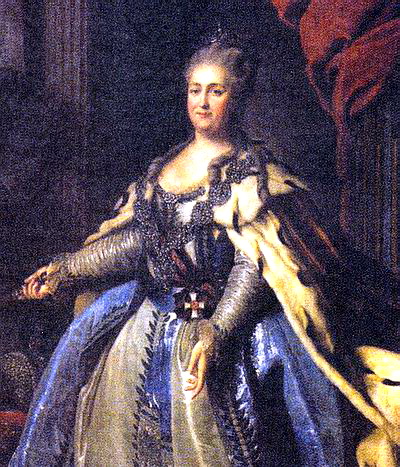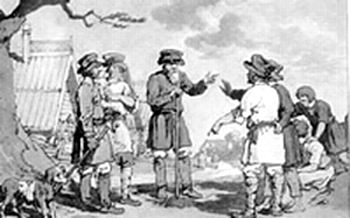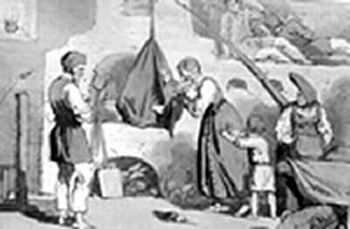Catherine The Great - Reform Of The Law

Catherine II
(Painting of Russian School, copy after Alexander Roslin)
II Reform of the Law
Although Catherine did not hesitate to follow self-interest in foreign relations, she took an idealistic view of her domestic problems. She turned from Machiavelli¹ to Montesquieu². When she thought of Courland and Poland she pictured herself as a general on horseback; when she thought of Russia she pictured herself as the Little Mother, Matushka. She and Russia were united against the rest of the world.
The Empress wished to make her people happy without making hers elf unhappy. Russia had despotic, conflicting, chaotic laws. There was a printed code which had been handed down from Czar Alexei Michaelovich, the father of Peter the Great. But chiefly the people were ruled by ukase³. Not always, however, did the Russians obey promptly. It was commonly said of the peasants when some order had not been obeyed, "They are waiting for the third ukase." During the reign of Elisabeth Petrovna, the Senate had discussed the need of codifying the laws but postponements had ensued and nothing had been accomplished. On the threshold of her reign, Catherine was met by this need. It was a task made to her hand.
She took the ancient code of Czar Alexei in one hand and Montesquieu's Spirit of Laws in the other. There seemed to be no way of reconciling the two; so she decided that she had better cleave4 to Montesquieu altogether. She worked three hours every day for more than three years and produced a
¹ Niccolo Macchiavelli (1469-1527), Florentine statesman and political philosopher; secretary to the war council of the Florentine republic (1498- 1512). His most famous work is II Principe (The Prince,1532).
² Baron de la Brede et de Montesquieu (1689-1755), French political philosopher. His chief work is L'Esprit des lois (1748), a comparative analysis of various forms of government, which had a profound influence on political thought in Europe and the U.S.
³Ukaze: (in imperial Russia) an edict of the tsar.
4 To cleave: to cling or adhere.
thick volume. There was but little original thought in it as most of it had been adapted from her philosopher and guide. It was published under the title "Instruction of Her Imperial Majesty Catherine the Second for the Commission charged with preparing a project of a new code of laws." It was more briefly known in Russian as the Nakaz.
She worked secretly, showing her book to no one but Panin and.Orlov. Count Panin was delighted. The Empress was at last engaged on a plan in which he could whole-heartedly share, that of putting political and social ideals on paper. The Count cried out, while his huge wig flopped to one side in his excitement, "These are principles which will cast down walls!"
In the summer of 1767 the work was at last finished. In December Catherine had sent out a ukase ordering the election of delegates for a legislative commission. During the spring, a time of great floods in Russia, the elections had taken place. There had been much groaning and protesting from districts afflicted by heavy rains, as the swollen streams made travel difficult and dangerous, but the new Empress ignored all excuses for delay and somehow or other the streams were forded¹. In early summer, the delegates began to arrive in Moscow, in kibitkas, on horseback, on foot. They represented cities, districts, social classes, religions, races. There were Russian nobles wearing laces, diamonds, and velvets made up in the latest Pans fashion; there were merchants and military men; there were a few peasants in smocks; there were Tartars and Bashkirs. Well over a thousand delegates assembled.
Prior to the convention, the Empress sequestered² herself in the Kolomenakoe Palace not far from Moscow. Here she gathered around her various thinking persons, as she called them, and only asked them to criticize her manuscript. To meet their conflicting objections, she crossed out so much that half of the Instruction is left. Collecting the remnant of her labors, she
¹ To ford: to cross (a river, brook, etc.) over a shallow area.
² To sequester: to retire into seclusion.
sent it to the printer, and then had it read before the legislative convention. As many of the delegates could not read, it was necessary that the Instruction should be read aloud frequently and fully. At first the delegates rose in a body at the first sound of Her Majesty's words; but the document was read too often and too lengthily. Finally they just remained sitting or milled around according to their custom. Some English visitors who attended the convention called it a riot. Whether the meeting was really as tumultuous as the English Parliament can be on occasion is doubtful. But the Russian delegates wore so many gay, primitive colors, it probably seemed to Anglo-Saxon observers as if they expressed excitement and barbarism in every way.
The legislative commission dragged on a year and a half. The first sessions took place in the Kremlin but shifted to Petersburg when the Empress returned to her northern residence.
The Instruction abounds in democratic ideas. It goes so far as advocating the gradual abolition of serfdom by allowing the

Scenes of Russia at the time of Catherine II: A village Council of Elders
(Original thawing by an English traveller)
serfs to own property and to purchase their own freedom. But the Russian nobles were not in favor of the reform. Most of the plan was crossed out by her counselors before the Instruction ever went to prim and the remainder was eliminated by speeches in the convention. The Empress abandoned all propaganda for the abolition of serfdom for the rest of her life and consoled her conscience by abusing the Russian nobles in her memoirs. "What had I not to suffer from the voice of an irrational and cruel public opinion when this question was considered in the legislative commission! The mob of nobles, whose number was much greater than I had ever supposed because I had judged them too much by the people who daily surrounded me, began to suspect that these discussions might bring about an improvement in the position of the peasants... I believe that there were not twenty human beings who reflected on the subject at that time with humanity, really like human beings!"

Scenes of Russia at the time of Catherine II: A simple home scene
(Original drawing by an English traveller)
III The Campaign for Vaccination
Catherine's campaign against smallpox in Russia won great fame for her in Europe. It must be admitted that her step took courage in those days. The prevalence of the disease was such that everybody believed that everybody had to have it. For instance, the court spoke of the Grand Duke's uncertain chance of life because he "had not yet had the smallpox." The royal family had no more protection than the poorest peasant. The fiancé of Empress Elisabeth had been carried off by smallpox on the eve of his marriage and Peter the Second had died in early youth of the same disease. From the time of Catherine's arrival in Russia she was constantly pursued by the fear of the pest and every time she fell ill she thought it had overtaken her.
She had heard of vaccination in England. Her admiration for English institutions had been encouraged by her friendship with Sir Charles Hanbury 'Williams and the influence of Voltaire. The practical English had imported vaccination from the Orient, and an Englishwoman, Lady Mary Wortley Montagu, had set a brave example by allowing herself and her son to be inoculated¹. On the other hand, there were many voices raised against it. The physicians of the Sorbonne discountenanced² vaccination and disregarded the experience of England with the practice. Frederick the Great was intensely afraid of it and wrote to Catherine to urge her strongly not to take the risk. She replied that she had always feared the smallpox and wished more than anything else to be freed of her enslavement to this fear. "I am so Struck by a situation so unworthy that I regard it as a weakness not to escape from it."
She entered into correspondence with an English surgeon, Dr. Thomas Dimsdale, who was adventurous enough to accept her invitation to come to Russia. He had published a work on
¹ Inoculate: to introduce (the causative agent of a disease) into the body of (a person or animal), in order to induce immunity.
² Discountenance: to disapprove of.
inoculation and this had attracted the Empress's attention; she had always been a great importer and reader of foreign books. The famous Dr. Dimsdale arrested her attention, preoccupied as she was at all times with her anxiety about smallpox.
He arrived at the court of Petersburg in December, 1768. He was received as all foreign guests were received with social entertainments which the worthy doctor subsequently described in full in his tracts on inoculation in Russia. The Empress had been warned against the experiment and her fears were rife¹. Although she had sent for Dimsdale to vaccinate her, she still continued to discuss the matter pro and con. At last she put an end to her fears by ordering the physician to vaccinate her secretly one day. The test succeeded capitally². The ghost of this fear was laid, never to walk again.
The Grand Duke Paul was now vaccinated and Gregory Orlov. On the second day after the operation, Orlov had gone hunting. This was news to send to Europe, still trembling at the bare thought of vaccination. The Empress wrote the story to Voltaire, trusting him to spread it in the proper quarters. All at once she was ashamed that she had ever been so timorous as to fear vaccination. After all, every street urchin³ in England had as much courage as that! She urged inoculation upon court circles in Petersburg and the aristocratic Russians suddenly became very bold. Dr. Dimsdale was kept busy with impatient applicants. "A few weeks ago," said Catherine, "nobody would hear of inoculation; but now nobody can wait to be vaccinated. It has become the fashion."
Extracts from Catherine the Great by Katharine Anthony
Garden City publishing Company, Garden City, New York
¹ Rife: abundant.
².Capitally: in an excellent manner, admirably.
³.Urchin: a mischivious child, esp. one young, small or raggedly dressed
Related Books
- Alexander the Great
- Arguments for The Existence of God
- But it is done
- Catherine The Great
- Danton
- Episodes from Raghuvamsham of Kalidasa
- Gods and The World
- Homer and The Iliad - Sri Aurobindo and Ilion
- Indian Institute of Teacher Education
- Joan of Arc
- Lenin
- Leonardo Da Vinci
- Lincoln Idealist and Pragmatist
- Marie Sklodowska Curie
- Mystery and Excellence on The Human Body
- Nachiketas
- Nala and Damayanti
- Napoleon
- Parvati's Tapasya
- Science and Spirituality
- Socrates
- Sri Krishna in Brindavan
- Sri Rama
- Svapnavasavadattam
- Taittiriya Upanishad
- The Aim of Life
- The Crucifixion
- The Good Teacher and The Good Pupil
- The Power of Love
- The Siege of Troy
- Uniting Men - Jean Monnet